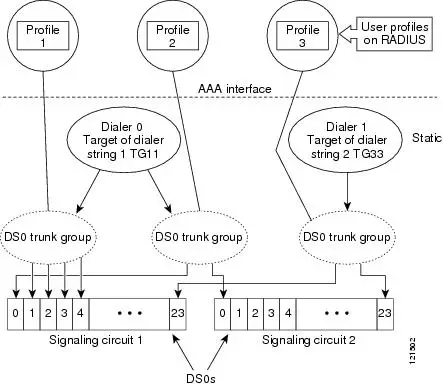In the realm of digital telecommunications, Digital Signal Zero (DS0) stands as a foundational building block. Defining a transmission rate of 64 Kbps, DS0 is the bedrock upon which modern digital communication systems are built. From facilitating a single voice channel to transmitting data, the versatility and efficiency of DS0 have made it a standard in the industry.
This article will delve into the technical intricacies of DS0, exploring its definition, importance, and applications. We will uncover how DS0 serves as a crucial element in the hierarchy of digital signaling and its role in shaping the landscape of digital transmission.
In this article:
- What is DS0?
- DS0 in Various Telecommunication Applications
- The Role of DS0 in the Digital Hierarchy
- Technical Standards and Protocols Associated with DS0
- Advancements and Modern Implementations of DS0
- Troubleshooting and Optimizing DS0 Channels
- References and Further Reading

1. What is DS0?
Digital Signal Zero, commonly referred to as DS0, is a digital signaling standard in telecommunications. Characterized by its transmission rate of 64 Kbps, it is the basic unit of data in digital networks. DS0 is not just a measure of speed; it represents a discrete channel in the digital hierarchy.
Historical Context
DS0 emerged from the need for a standardized digital transmission rate that could efficiently handle voice and data over telecommunication networks. It replaced the analog methods of the past, offering clearer, more reliable communication.
Technical Aspects
Telecommunication carriers transmit digital signals in multiples of DS0 called DS1, DS2, and so on. These multiples differ depending on whether you are dealing with the T-carrier system of North America or the E-carrier system of Europe and other continents.

The following table lists the common DS-series transmission rates and their T-series or E-series equivalents (when defined). For example, you can see that a T1 data transmission is equivalent to 24 DS0 transmissions multiplexed together and can transmit data at a rate of 1.544 Mbps.
DS-Series Transmission Rates
| DS Type | Multiple of DS0 | Data Rate | T-Series | E-Series |
| DS0 | 1 | 64 Kbps | N/A | N/A |
| DS1 | 24 | 1.544 Mbps | T1 | N/A |
| N/A | 32 | 2.048 Mbps | N/A | E1 |
| DS1C | 48 | 3.152 Mbps | N/A | N/A |
| DS2 | 96 | 6.312 Mbps | T2 | N/A |
| N/A | 128 | 8.448 Mbps | N/A | E2 |
| N/A | 512 | 34.368 Mbps | N/A | E3 |
| DS3 | 672 | 44.736 Mbps | T3 | N/A |
| N/A | 2048 | 139.264 Mbps | N/A | E4 |
| DS4 | 4032 | 274.176 Mbps | N/A | N/A |
| N/A | 8192 | 565.148 Mbps | N/A | E5 |
PCM and Voice Data
In the context of voice transmission, PCM digitizes analog voice signals. This process involves sampling the voice signal 8,000 times per second, with each sample represented by an 8-bit value, culminating in the 64 Kbps rate (8 bits x 8,000 samples).
2. DS0 in Various Telecommunication Applications
Voice Transmission
DS0’s primary and traditional application is in voice transmission:
- Digital Voice Channels: Each DS0 channel can carry one voice conversation. The use of PCM for digitizing analog voice signals makes DS0 an efficient means of high-quality voice transmission.
- Clarity and Reliability: Compared to analog systems, DS0 channels offer clearer voice quality with less interference and greater reliability.
Data Communication
DS0 channels are not limited to voice and find extensive use in data communication:
- Data Transfer: With a transmission rate of 64 Kbps, DS0 is suited for basic data communication needs, including point-to-point data links.
- Flexible Data Solutions: In settings where high bandwidth is not a necessity, DS0 provides an effective and economical data transmission solution.
Integration with Internet Services
In the era of the Internet, DS0 has adapted to serve digital needs:
- Internet Connectivity: DS0 channels are used in various configurations to provide internet connectivity, especially in scenarios where higher bandwidth lines like T1 or E1 are not required or feasible.
- Backbone of DSL Services: In DSL (Digital Subscriber Line) technologies, multiple DS0 channels are often used to provide the underlying infrastructure for broadband internet services.
In conclusion, Digital Signal 0’s role in the digital hierarchy and its diverse applications in telecommunications highlight its enduring relevance in the digital communication landscape. Its foundational position in the digital signaling hierarchy and its adaptability across various communication needs underline its significance in the field.
3. The Role of DS0 in the Digital Hierarchy
Understanding the Place of DS0 in the Digital Signaling Hierarchy
DS0, as the fundamental unit in the digital signaling hierarchy, forms the base level upon which more complex systems like T1 and E1 are built.
- Foundation of Higher-Level Systems: In the digital hierarchy, multiple DS0 channels are combined to form higher-capacity data links. For instance, a T1 line in North America consists of 24 DS0 channels, each contributing 64 Kbps, to reach a total capacity of 1.544 Mbps. Similarly, an E1 line, widely used in Europe, aggregates 30 DS0 channels to achieve a bandwidth of 2.048 Mbps.
- Versatility Across Regions: The adaptability of DS0 allows it to be the cornerstone of various regional standards, underpinning T1, E1, and other systems. This universality cements its importance in global telecommunications infrastructure.
- Modularity and Scalability: DS0’s modular nature enables scalable telecommunication solutions. Networks can allocate bandwidth based on the number of DS0 channels required, offering flexibility and efficiency in data transmission.
How DS0 Channels are Aggregated for Higher Capacities
The aggregation of DS0 channels into higher capacity data streams involves precise synchronization and multiplexing techniques:
- Time-Division Multiplexing (TDM): This method is used to combine multiple DS0 channels into a single, higher-capacity line. TDM interleaves bits from each DS0 channel in a sequential pattern, effectively utilizing the entire bandwidth of the line.
- Streamlining Communication: By aggregating multiple DS0 channels, service providers can streamline communication networks, offering multiple voice and data channels over a single physical medium.
4. Technical Standards and Protocols Associated with DS0
Overview of Relevant ITU-T and ANSI Standards
Digital Signal Zero, as a fundamental unit of digital transmission, is governed by a set of international and national standards:
- ITU-T Standards: The International Telecommunication Union – Telecommunication Standardization Sector (ITU-T) provides various recommendations that define the technical aspects of DS0. Notably, the G series of recommendations (like G.711) outline the aspects of voice and audio codec requirements and the I series for ISDN protocols.
- ANSI Standards: The American National Standards Institute (ANSI) also provides standards that are crucial for DS0, especially in the context of T1 lines (T1.107, T1.113, etc.). These standards outline the electrical characteristics and framing structures for digital transmission systems using DS0.
Protocols that Govern the Use of DS0 in Networks
DS0 operates within a network under specific protocols:
- PCM Encoding: For voice transmission, Pulse Code Modulation (PCM) is the primary protocol used in DS0. This protocol governs the digitization of analog voice signals into a 64 Kbps digital stream.
- Signaling Protocols: Various signaling protocols, both channel-associated and common channel signaling, are used in conjunction with DS0 channels for establishing and managing calls in telecommunication networks.
5. Advancements and Modern Implementations of DS0
Evolution of DS0 in the Context of Advancing Telecommunication Technology
DS0 has evolved significantly since its inception, adapting to the changing landscape of telecommunication:
- Integration with Digital Systems: Originally used primarily for voice transmission, DS0 has seamlessly integrated into digital systems, supporting a variety of data and multimedia services.
- Enhanced Coding Techniques: Advancements in coding techniques have allowed ‘Digital Signal 0’ to carry data more efficiently, with better error correction and compression methods.
Current Applications and Emerging Trends
Despite the advent of higher bandwidth technologies, DS0 remains relevant:
- Continued Use in Legacy Systems: Many legacy systems and rural telecommunications networks still rely on DS0 for voice and basic data services due to its reliability and widespread implementation.
- Foundation for Emerging Technologies: DS0 channels form the basis for more advanced digital services, such as DSL and ISDN, and continue to be a reference point for newer technologies.
- Emerging Trends: With the ongoing digital transformation, there is a trend towards integrating DS0 with newer digital technologies, ensuring its compatibility and relevance in modern network infrastructures.
In summary, Digital Signal 0’s technical standards and protocols ensure its reliable operation in telecommunications, while its continuous evolution and adaptation reflect its enduring significance in the field. Its role in both traditional and modern telecommunication systems underscores its versatility and foundational importance.
6. Troubleshooting and Optimizing DS0 Channels
Common Issues and Challenges in DS0 Implementations
DS0 implementations, while robust, can encounter specific issues that require attention:
- Signal Degradation: Over long distances or through poor-quality transmission media, DS0 signals can degrade, leading to a loss of data integrity.
- Interference and Crosstalk: In environments with multiple transmission lines, DS0 channels might experience interference or crosstalk, affecting signal clarity, especially in voice transmissions.
- Hardware and Wiring Issues: Faulty hardware or improper wiring can lead to disruptions in DS0 channels, resulting in connectivity issues.
Best Practices for Maintaining and Optimizing DS0 Channels
To ensure the efficient functioning of DS0 channels:
- Regular System Audits: Conduct periodic audits to check the integrity of transmission lines and hardware components.
- Use of Quality Wiring and Shielding: Implement high-quality wiring and shielding techniques to minimize signal degradation and interference.
- Firmware and Hardware Upgrades: Keep transmission equipment up-to-date with the latest firmware and consider hardware upgrades to improve performance and compatibility.
- Monitoring Tools: Utilize network monitoring tools to detect and troubleshoot issues proactively, such as signal loss or bandwidth bottlenecks.
7. References and Further Reading
Technical Documentation and Whitepapers
- ITU-T Recommendations: Access the ITU-T’s G and I series recommendations for detailed standards on digital signaling and DS0.
- ANSI Standards: Review ANSI’s documentation for specific technical details on DS0 implementation in T1 lines.
Essential Books and Articles on Digital Signaling
- “Digital Telephony” by John Bellamy: This book provides a comprehensive look at the fundamentals of digital communication, including DS0.
- “Understanding Telecommunications Networks” by Andy Valdar & Ian Morfett: Offers insights into DS0’s role in broader telecommunication networks.